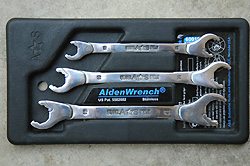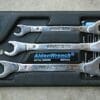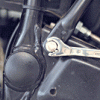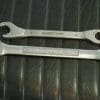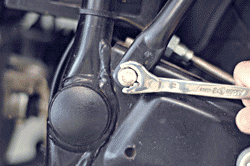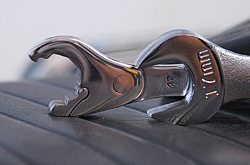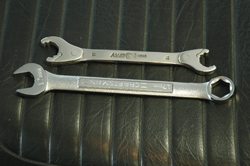The Alden wrench has a unique design
It combines open-end wrench with ratcheting function.
It’s very useful in certain situations where there isn’t enough room to swing a conventional wrench. Hand polished 17-4PH stainless steel. 30-day satisfaction guarantee.
Note: As of June 2011, Alden Wrench was bought by Chicago Brand Industrial Inc. in Fremont California and the wrenches are available again!
Tool freaks come in all shapes and sizes.
I’m sure that a close study of “Toolies” would make for a very interesting psychological thesis, because the affliction known as Toolitis can manifest itself in many variations.
At the basic level, there are, for example, the “need every tool” types, who buy any and every tool they can find, anywhere, anytime, no matter the quality.
This type can be identified by the shoe boxes full of cheap, rusty, stamped metal open-end wrenches that fill the garage.
Then there’s the “tool category” types, who collect multiple versions of tools that do the same thing.
Open a drawer in their tool chest (it goes without saying that any serious Toolie will have a tool chest that has more storage than a Vegas hotel has rooms) and you’ll see row upon row of different brands of box-end wrenches, screwdrivers, hex keys and the like, all sorted by brand.
Or how about the variation of the disease that forces the Toolie to purchase one example of every tool ever made, but only of the absolute best quality?
Their spouse typically doesn’t understand why the $150.00 version works so much better than the five-buck Wal-Mart brand. Can you imagine?
Victims also usually have two or more combinations of the affliction.
For example, one of the basic variations of the syndrome can be combined with a tool labeling fixation, a tool polishing fixation, or the “arrangement syndrome”.
This deadly variant involves a pathological compulsion to continuously rearrange the contents of a tool chest to come up with the perfect layout.
Of course, the perfect arrangement can never be found, and left untreated, this variation of the disease usually has serious consequences.
There are Toolies who never use the tools in their collection, instead using only the cheap pot metal tools they store in a ratty old toolbox.
After all, who would want to dirty a beautiful specimen of a 1940’s 15/16″ Armstrong offset box wrench?
My affliction tends towards collecting the unique and different. I have a mortal fear that someday I’ll be working on a project and won’t have the right tool.
The corollary of this is my unquenchable desire to discover a new type of tool that will perform a task better than a similar tool that I already have.
That’s what lead me to discover Mr. Alden’s wrenches.
I don’t know Ray Alden, but I did correspond with him briefly to try and obtain a set of Metric Alden wrenches back before they became (somewhat) more popular.
His patent application shows a date of November of 2003 (U.S. Patent number 5582082), so I’m assuming that they are a relatively recent invention.
I wasn’t able to find out much about the story behind the wrench, other than the design was motivated by the desire to have an open-end wrench that worked somewhat like a Gearwrench (review) — that is, with a ratcheting capability.
Supposedly, the Alden wrenches were originally developed for use in the aerospace industry to allow mechanics to tighten nuts and bolts in very tight spaces.
Since motorcycle repair can also mean working in tight quarters, I figured I had to have a set of Alden wrenches someday.
It’s funny how you can survive for many years without realizing that a product like this even exists, then all of a sudden you absolutely can’t live without it!
Alden wrenches are made from hand-polished 17-4PH stainless steel (.pdf) and the hand polishing gives them an interesting character with a custom-made look.
Like many tools used in the aerospace industry, the Alden wrenches do not use any type of chrome plating.
This eliminates the possibility of chrome chips from getting inside of a critical airplane assembly.
17-4PH stainless steel is also very corrosion resistant, so the wrenches should last a long time without getting rusty, even in harsh environments.
We frequently used 17-4PH stainless when I worked as a machinist for a company that made products for the paper industry.
The paper making process results in all sorts of extremely harsh “liquor” that’s very tough on metal, thus the use of corrosion resistant steels like 17-4PH and exotic and impossible-to-cut stuff like Ferralium 255.
Chrome plating doesn’t add any functionality to a tool anyway, and if it does flake off, the plating can’t be replaced.
The Alden wrench, on the other hand, may be more easily scratched, but it can be re-polished if desired. But a few scratches aren’t going to hurt, and will just give the tool more character anyway.
The best part of Mr. Alden’s wrench design is the way it works. The wrenches have a uniquely shaped head, with a spring-loaded “under-jaw” that acts as a ratchet.
Most open-end wrenches need as much as 60 degrees of swing to work, but the Alden wrench only needs 30 degrees.
The design of the wrench also allows them to fit slight variations in fastener sizes when the fastener head is rusted or deformed.
The 17-4PH stainless is not as hard as the metal used in conventional wrenches. This allows the tool to “bite” the fastener, providing a good grip.
The head of the Alden wrench acts like a “Monkey wrench”, that is, as more force is applied, the wrench provides a tighter grip on the fastener.
Look closely at the photo on the left, and you will see that the lower jaw of the Alden wrench has two notches.
The innermost notch provides the best grip on the fastener, but the outer notch can also be used and comes into play when the fastener becomes loose.
Either notch will give the Alden wrench its unique ratcheting ability.
The ratcheting ability is very useful in certain situations where a box-end wrench can’t be fitted on the fastener, and there isn’t enough room to swing a conventional open-end wrench.
This is a frequent occurrence when working on motorcycles, and I’ve found the Alden wrench to be just the right tool in certain situations and a real time saver.
The Alden wrenches can slide into places that other tools can’t, and the combination of the open end and the ratcheting mechanism is sometimes exactly what’s needed to complete a difficult task.
The only catch is that these wrenches are not made to carry huge loads of torque.
They should be considered as precision tools that perform a very useful task, and are sometimes the only tool that will fit. When this is the case, they are worth their weight in gold.
The Alden wrenches can be purchased separately, but for the price, it’s hard to resist the set.
They are often discounted to $25.00 or less for a set. Three Metric Alden wrenches cover the most common sizes used on motorcycles.
Each wrench has two different sized heads: 10mm – 12mm, 13mm – 14mm and 15mm – 17mm.
You don’t have to be a certified tool freak to get lots of use from these unique tools. If you perform occasional or serious work on your motorcycle, these tools are highly recommended.
| wBW Review: Alden Wrench Set | |
|---|---|
| Manufacturer: Alden Wrench (Chicago Brand Industrial Inc.) | List Price (2005?): $29.95 per set |
| Sizes: Metric: 10, 12, 13, 14, 15, 17 mm. Standard: 3/8″, 7/16″, 1/2″, 9/16″, 5/8″, 11/16″ | Made In: China |
| Review Date: February 2011 | |
Owner Comments and Feedback
See details on submitting comments.


